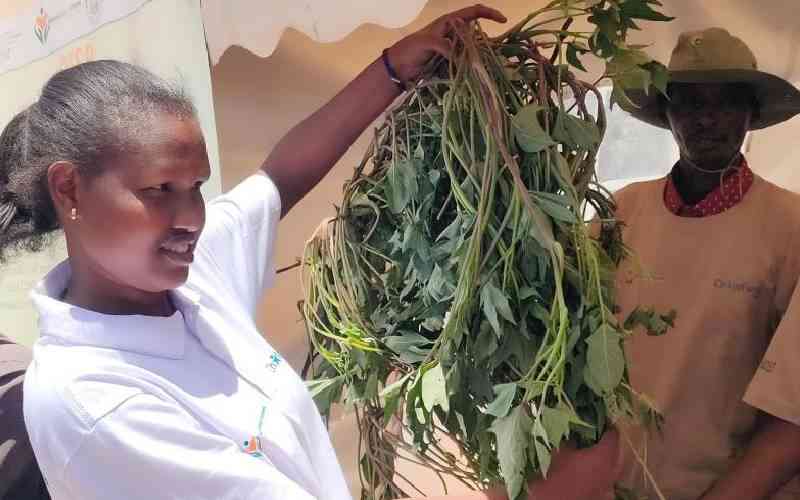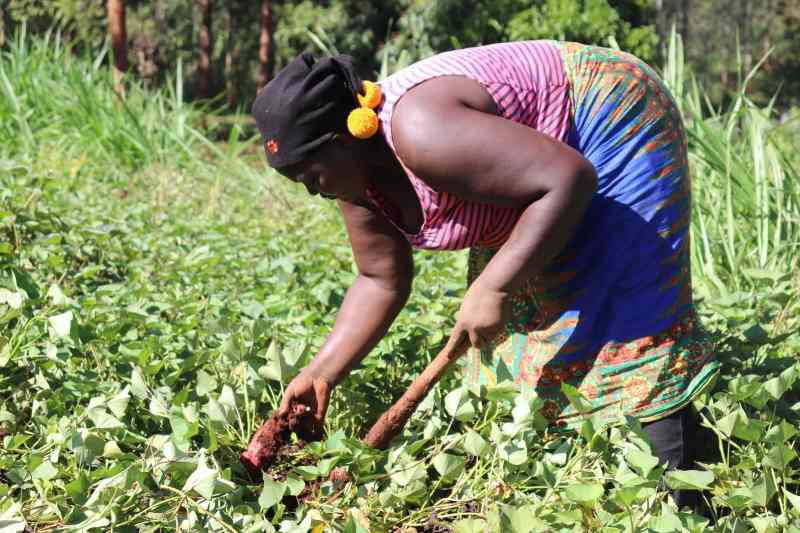Potato farmers are set to earn more for their crop after the Government initiated legislation that seeks to dismantle the cartel-like behaviour that has characterised the Sh60 billion industry.
Through the Potato Produce and Marketing Bill 2014, the Government has set out a plan to shield farmers from unscrupulous traders.
The law, authored by Nyandarua Senator Muriuki Karue, seeks to create a regulatory framework that will enhance production, packaging and marketing of potatoes.
New traders
The framework, Mr Karue said, would be implemented by a 16-member National Potato Council (NPC) that would be formed once the Bill is enacted into law.
The Bill also seeks to manage the politics around the marketing of the crop. For instance, potatoes are largely consumed in urban centres, but markets in these areas are controlled by cartels that frustrate the entry of new traders.
Karue said the proposed council would offer guidance on implementing best practices to ensure a level playing field for all actors along the value chain.
The NPC would also be expected to change the perception potatoes have gotten of only being good for junk food, such as French fries and crisps. The crop will be marketed as crucial to meeting dietary needs as, according to Karue, the ‘junk food’ perception has undermined its contribution to the country’s food and nutritional security.
The proposed council would also support efforts to promote the production of affordable certified potato seeds.
“Once it is enacted into law, the Bill will enhance the productivity and income of potato farmers, improve the efficiency of potato farming, and promote the production and use of high-quality seed potatoes,” said Karue.
He added that the Bill has passed the first reading, and once Parliament resumes from recess, it would be tabled for a second reading.
Esther Kimani, the acting managing director of the Kenya Plant Health Services Inspectorate Services (Kephis), welcomed efforts to boost productivity, saying the supply of potatoes in the market is yet to match demand. This has forced some companies in the country to import the crop from Egypt and South Africa.
“More than 90 per cent of farmers recycle their produce every planting season, which has seen them end up with low yields,” said Dr Kimani.
“This has also contributed to the escalation of pests and diseases.”
She added that the seven companies registered to produce certified seeds are only able to produce 36 varieties, which meets 2 per cent of demand.
Stay informed. Subscribe to our newsletter
In 2012, Kenya signed a bilateral agreement with the Netherlands to import seed potato, which has since led to the release of 17 varieties, though these are yet to be made available to local farmers.
Opposed provisions
Karue said that if the proposals in the Bill are implemented, certified seed production would increase by 50 per cent within five years.
The National Potato Council of Kenya (NPCK), however, has opposed some of the provisions of the Bill, saying they cannot be implemented in the current environment. The firm’s CEO, Wachira Kaguongo, added that the Bill lacked input from all stakeholders.
Further, he said, the creation of a new agency in the potato industry would go against the current Government reform agenda that is merging State corporations to avoid the duplication of roles.
“We already have a council, therefore, the Government has no reason to create another one. We accommodate all the players along the value chain,” said Mr Kaguongo.
He also took issue with the proposal to retain potato bags at 110 kilogrammes, saying it goes against efforts to harmonise standards within the East African Community (EAC), which advocate a 50kg bag.
“International labour laws prohibit a human being from carrying a bag of commodity that is beyond 50 kilos.”
Potatoes are grown by more than 800,000 farmers, a majority of whom are smallholders who produce 83 per cent of the national harvest.
According to the 2014 Economic Survey, potato production increased by 40 per cent from 1.5 million tonnes in 2012 to 2.1 million tonnes last year.
 The Standard Group Plc is a
multi-media organization with investments in media platforms spanning newspaper
print operations, television, radio broadcasting, digital and online services. The
Standard Group is recognized as a leading multi-media house in Kenya with a key
influence in matters of national and international interest.
The Standard Group Plc is a
multi-media organization with investments in media platforms spanning newspaper
print operations, television, radio broadcasting, digital and online services. The
Standard Group is recognized as a leading multi-media house in Kenya with a key
influence in matters of national and international interest.
 The Standard Group Plc is a
multi-media organization with investments in media platforms spanning newspaper
print operations, television, radio broadcasting, digital and online services. The
Standard Group is recognized as a leading multi-media house in Kenya with a key
influence in matters of national and international interest.
The Standard Group Plc is a
multi-media organization with investments in media platforms spanning newspaper
print operations, television, radio broadcasting, digital and online services. The
Standard Group is recognized as a leading multi-media house in Kenya with a key
influence in matters of national and international interest.








